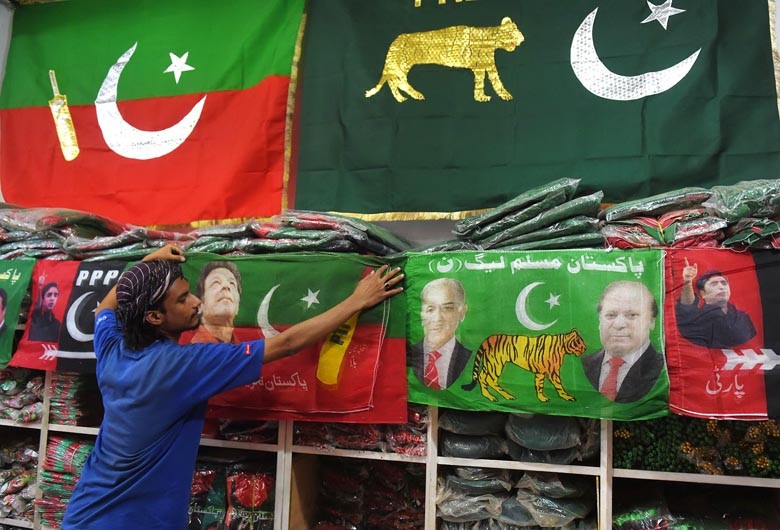
Internal rifts, backlash and defiance from local party leaders and workers have hit many political parties, particularly the PTI and PML-N

The sprawling hilltop residence of Pakistan Tehreek-i-Insaf (PTI) Chairman Imran Khan in Banigala has remained guarded by more than 100 policemen for the past several days. Reason: to prevent party workers from protesting outside his house against the "unjust" issuance of party tickets for the upcoming general elections.
Apparently, Khan has been using the backdoor to his house to avoid protestors from NA154 in Multan. They staged a sit-in against the party’s decision to award a ticket to former federal minister Sikandar Hayat Bosan, who joined the party last month after completing a five-year term with PML-N, and not their local leader Ahmed Hassan Dehr.
"We’ve worked for the party for years and at the time of elections turncoats are taking the lead… This hurts us. This forces us to think if the party has drifted away from its ideology," says Yasir Akhtar, a protestor from Multan.
The PTI is not the only party these days facing resistance. Internal rifts, backlash and defiance from local party leaders and workers have hit many political parties, particularly the PTI and PML-N because they are considered the main contenders in Punjab.
As many as 4,100 candidates submitted applications for getting nominated by the PTI in the general election 2018, followed by 3,267 applications in PML-N.
Nawab of Kalabagh Malik Waheed Khan secured 76,684 votes for the PTI from Mianwali in the previous elections but has been denied a ticket this time. Earlier, the PTI ignored former Khyber Pakhtunkhwa minister and a prominent defender on talk shows, Ali Muhammad Khan. He has been awarded ticket a few days ago.
Former PML-N ministers Zaeem Qadri and Ch. Nisar Ali Khan were denied ticket among many others because of ‘doubtful loyalties’. In Lahore’s Model Town, the PML-N activists protested against awarding ticket to Talal Chaudhry, a PML-N loyalist.
Even in Islamabad, with only three National Assembly seats, strong differences between aspiring candidates from the PTI and PML-N have been reported.
Such internal rifts are also evident within the PPP in Sindh. PPP parliamentarian Dr Nafisa Shah was issued a ticket from her home constituency Khairpur after much reluctance.
Many of the sidelined local leaders have decided to contest elections independently. In Layyah, Punjab, district president of PTI left the party and decided to contest independently after expressing concerns on the process of awarding tickets in the area.
"Resentments over nominations in constituencies at the grassroots, and second and third tiers within the parties is actually good for strengthening democracy," says political scientist Dr Rasul Bakhsh Rais. "It is good. They would like to be heard and their views on the party candidates have to be reflected."
He adds that this is the beginning of democratisation within the political parties but "we don’t know what shape they will take in future. This will help parties in evolving a mechanism for the nominations, gradually."
Many party workers believe the nomination of candidates is based on connections with the party bigwigs and the amount of money they are willing to spend.
It is also believed that the party activists feel a kind of exaggerated sense of self-importance. They think they will lose their importance to the party if not nominated.
Read also: Observing the observers
The process of awarding tickets to candidates entails forming a parliamentary board within the parties that evaluates and approves candidates. But, in case of parties where the heads are officious, they make the decision.
"The good party workers question the party leaderships rather than simply accepting the dictates from the top. These protests are strengthening democracy within the parties," says Ahmed Bilal Mehboob, President Pakistan Institute of Legislative Development and Transparency (PILDAT).
He adds that the party structures in Pakistan are largely centralized. "The party heads decide the final names. This is against the political norms elsewhere in the world. Such dissenting voices will gradually shake the centralised system within the parties and will lead to a participatory approach. It’ll initiate a debate around electability and loyalty."